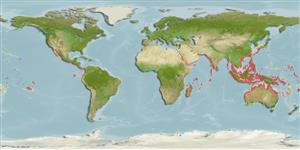>
Anguilliformes (Eels and morays) >
Ophichthidae (Snake eels) > Ophichthinae
Etymology: Pisodonophis: Greek, piso, pipisko = to drink + Greek, odous = teeth + Greek, ophis = serpent.
More on author: Richardson.
Environment: milieu / climate zone / depth range / distribution range
Ekologi
marina; sötvatten; brackvatten revassocierade; anadrom (Ref. 51243); djupintervall 1 - 20 m (Ref. 90102). Tropical
Indo-Pacific: Red Sea and East Africa to French Polynesia, north to the Ogasawara Islands, south to Australia.
Size / Vikt / Age
Maturity: Lm ? range ? - ? cm
Max length : 108 cm TL hane/ej könsbestämd; (Ref. 1479); common length : 50.0 cm TL hane/ej könsbestämd; (Ref. 7245)
Short description
Bestämningsnycklar | Morfologi | Morfometri
Taggstrålar i ryggfenan (totalt) : 0; Taggstrålar i analfenan: 0; Ryggkotor: 152 - 163. Teeth molariform, multiserial on jaws, intermaxillary and vomer; dorsal fin with broad dark edge (Ref. 37816). Dorsal fin beginning above pectoral fin (Ref. 12693). Body snake-like, cylindrical, compressed only along extreme tail tip; anterior nostril tubular, posterior nostril along lower edge of lip; median fins not continuous posteriorly; extreme tip of tail stiff and finless; dorsal fin origin over front to middle portion of pectoral fins; lateral line inconspicuous (Ref. 4832). Variable from grey to black or brown. Large individuals have wrinkled skin (Ref. 48635).
Occurs in lagoons and estuaries, entering freshwater (Ref. 12693). Often in tidal channels where loose groups congregate, and usually seen with just the head exposed (Ref. 48635). Caught most often in tidal areas and estuaries (Ref. 12693). Caught in bag nets and similar gear. Marketed fresh (Ref. 7050).
Life cycle and mating behavior
Könsmognad | Reproduktion | Lek | Ägg | Fecundity | Larver
McCosker, J.E. and P.H.J. Castle, 1986. Ophichthidae. p. 176-186. In M.M. Smith and P.C. Heemstra (eds.) Smiths' sea fishes. Springer-Verlag, Berlin. (Ref. 3972)
IUCN Red List Status (Ref. 130435: Version 2024-1)
Threat to humans
Harmless
Human uses
Fiskeri: mindre kommeriell
Verktyg
Special reports
Download XML
Internet-källor
Estimates based on models
Preferred temperature (Ref.
123201): 24.2 - 29.3, mean 28.4 °C (based on 3721 cells).
Phylogenetic diversity index (Ref.
82804): PD
50 = 0.5020 [Uniqueness, from 0.5 = low to 2.0 = high].
Bayesian length-weight: a=0.00063 (0.00033 - 0.00121), b=3.01 (2.84 - 3.18), in cm total length, based on LWR estimates for this species & (Sub)family-body (Ref.
93245).
Trofisk nivå (Ref.
69278): 3.8 ±0.6 se; based on size and trophs of closest relatives
Resiliens (Ref.
120179): Mellan, lägsta populationsfördubblingstid 1,4-4,4 år (Preliminary K or Fecundity.).
Fishing Vulnerability (Ref.
59153): High vulnerability (65 of 100).
Nutrients (Ref.
124155): Calcium = 30.8 [17.2, 57.1] mg/100g; Iron = 0.457 [0.272, 0.847] mg/100g; Protein = 19.1 [16.9, 21.7] %; Omega3 = 0.101 [0.046, 0.277] g/100g; Selenium = 38.2 [21.5, 73.7] μg/100g; VitaminA = 42.4 [12.8, 137.4] μg/100g; Zinc = 1.05 [0.75, 1.48] mg/100g (wet weight);
